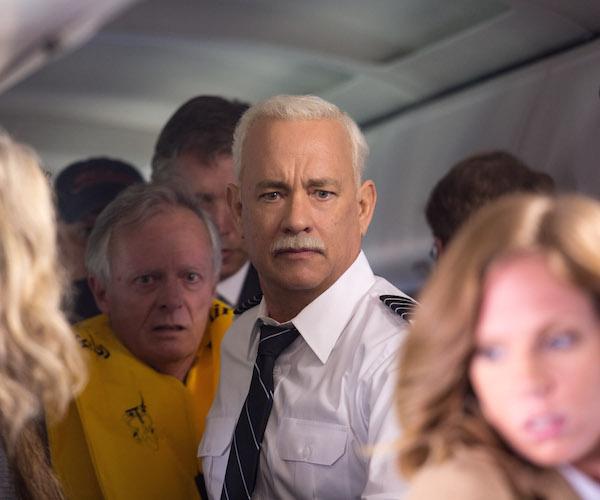Film Review: “Sully” — A Solid Shot of American Heroism
I was never bored during Sully‘s brisk 90 minutes.
Sully, directed by Clint Eastwood. Screening at AMC Assembly Row, Somerville, MA, and AMC Loews Boston Common 19.

Tom Hanks as Chesley “Sully” Sullenberger in a scene from “Sully.”
By Tim Jackson
Clint Eastwood has played bad good guys, good bad guys, and has directed more than few yarns about certified American heroes. Sully, his latest tale about individual triumph, deals with the real life American nice guy Chesley “Sully” Sullenberger. On January 15, 2009 the captain safely guided US Airways Flight 1549 to an emergency water landing on the Hudson River. The maneuver became known as “The Miracle on the Hudson.” The Airbus A320 had lost two engines and ‘thrust’ following a “bird strike.” With a combination of skill and courage, Sully saved the lives of all 155 passengers. He and his crew received a Congressional Resolution recognizing them for “heroism, calm under pressure, and dedication to the safety of passengers on board.” Sully was awarded the French Legion of Honor. So where is the conflict? Where are the good guys and bad guys?
Eastwood has taken a smart approach to the story, though the 85-year-old director has a tendency to develop character in broad strokes. The engines failed just after taking off over New York City. By going back and forth between the river landing and the present, Eastwood keeps the movie from boiling down to a suspense episode that otherwise would have taken only around twenty minutes. We know Sully has become legend; we’ve read about his action many times. The villain, as much as there is one, is set up to be The National Transportation Safety Board, who held hearings into the circumstances surrounding the emergency landing. Was Sully really courageous? Or did he act hastily when the wiser decision would have been to return to LaGuardia or to a runway in New Jersey? How could he NOT be a hero? Damn that myopic bureaucracy. At the time of the incident, Sully had logged 20,000 hours of flight time, he still called his wife regularly (even after he had just landed his plane on the freezing Hudson). He even pays for his drink before the bar’s patrons, who have dubbed him a hero, can pick up the tab (a TV new program happens to be showing a news report of his feat as he walks in).
The NTB panel looks at the computer evidence and displays real time simulations of the actual circumstances of the flight. Sully holds his ground, knowing that the ‘human factor’ is what really matters. The scowling and doubting of the panel feels contrived, particularly Anna Gun (Breaking Bad), who would be more suited to be a stalking horse at a PTA Board meeting. Tom Hanks, as Sully, once again plays the regular guy role with seriousness and skill. In the tradition of Jimmy Stewart’s plainspoken everyman, he celebrates extraordinary achievement with grace and without hard feelings. Aaron Eckhart, in a walrus mustache, plays co-pilot Jeff Skiles, an underwritten part that’s devoid of personality. Eckhart does what he can to anchor the role in gravitas and he does get in a good last line (no spoilers}. It brought cheers from the audience in the screening I attended. Where was this clever co-captain during the movie? The great Laura Linney (You Can Count on Me, Squid and the Whale) plays Sully’s very concerned wife back home. She answers the phone a lot. Real New Yorkers add welcome color to the rescue scenes which are, as far as I could tell, reenactments based on the actual news footage.
The special effects are good. The mechanics of the rescue are rousing; this is a fascinating and inspirational New York moment. I was never bored during the film’s brisk 90 minutes. As one of the characters in Sully opines, “It’s nice to have good news with a plane for a change.” The real crew and passengers are shown as the credits roll, so viewers are advised to sit still. Seeing the ‘real people’ is a crowd pleaser. Despite the film’s thin dramatics and characterizations, Americans are probably in need of a shot of ‘I’m OK, You’re OK’ in the form of a 60-million dollar non-disaster movie. Movies interact with life, and in a political season filled to the brim with lies, deceit, and vanity, Sully supplies a much needed dose of optimism.
Tim Jackson was an assistant professor of Digital Film and Video for 20 years. His music career in Boston began in the 1970s and includes some 20 groups, recordings, national and international tours, and contributions to film soundtracks. He studied theater and English as an undergraduate, and has also has worked helter skelter as an actor and member of SAG and AFTRA since the 1980s. He has directed three feature documentaries: Chaos and Order: Making American Theater about the American Repertory Theater; Radical Jesters, which profiles the practices of 11 interventionist artists and agit-prop performance groups; When Things Go Wrong: The Robin Lane Story, and the short film The American Gurner. He is a member of the Boston Society of Film Critics. You can read more of his work on his blog.
Tagged: Chesley “Sully” Sullenberger, Clint Eastwood, Miracle on the Hudson, Sully
